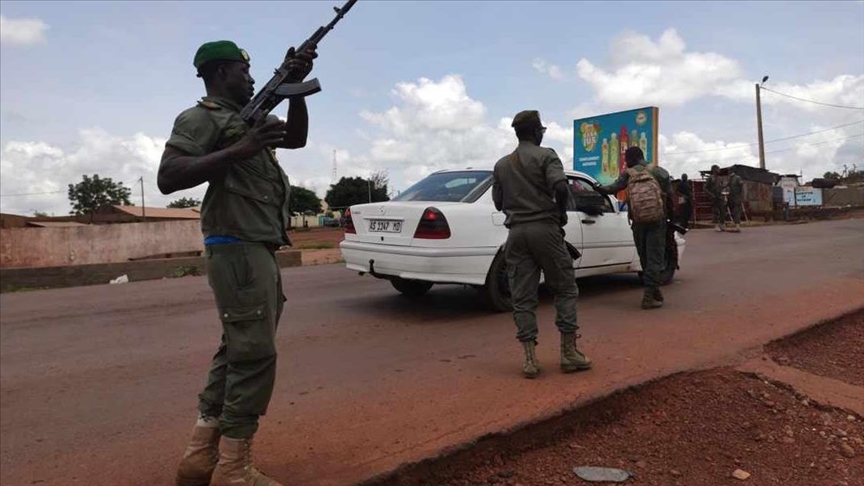Does end of peace deal with rebels doom Mali’s hopes for peace?
Fears of unrest have spiked since military junta terminated the 2015 agreement that kept a fragile peace in Mali’s north
 Bamako, Mali ( Fadi Cisse - Anadolu Agency )
Bamako, Mali ( Fadi Cisse - Anadolu Agency )
-Ending any peace deal means resuming war’ and increases risk of wider regional instability, warns analyst
KIGALI, Rwanda
The recent decision by Mali’s military government to end a key peace deal with separatist rebels in the north has raised concerns about the prospects for peace in the country.
The 2015 agreement with several mainly Tuareg rebel groups was backed by the UN and signed in Algeria’s capital Algiers.
For years, the Algiers accord was seen as the best hope of ending years of violence in the West African country.
But things have changed since the military overthrew President Ibrahim Boubacar Keita’s government and seized power in August 2020.
In July 2022, the Coordination of Azawad Movements (CMA), formed by semi-nomadic Tuareg people, accused the transitional government of abandoning the pact.
Last August, fighting erupted in the north after eight years of lull, while the Malian military also ordered the UN peacekeeping mission MINUSMA, which had a critical role as a guarantor of the Algiers agreement, to leave the country.
While announcing the end of the deal in late January, government spokesman Col. Abdoulaye Maiga said it was because of “the change in posture of some signatory groups,” while also accusing Algeria “of acts of hostility.”
On Feb. 5, Col. Assimi Goita, Mali’s military leader, argued that the deal had become “a business for certain actors,” while the CMA has said the transitional government’s decision to terminate the agreement was not surprising.
Algeria “regretted” Mali’s decision and said the reasons cited by the junta “did not correspond in any way to the truth or reality.”
According to Rwandan political analyst Ladislas Ngendahimana, the decision spells trouble for peace efforts in Mali and the wider region.
The deal might have not been perfect but it is better than having none, he said.
“Ending a peace deal is indeed waging a new war … Ending any peace deal means resuming the war, which is likely to exacerbate terrorism in the region,” he told Anadolu.
At the core of the peace deal was the objective of integrating rebels into the national army and decentralizing governance in the country of about 22 million people.
However, there were always concerns about the implementation.
The Carter Center, founded by ex-US President Jimmy Carter and his wife, was appointed as the independent observer of the 2015 peace agreement.
It warned in 2022 of an “unprecedented impasse” in the implementation process, saying that dialogue between the Malian government and the CMA had grown increasingly difficult since October 2021.
According to Ngendahimana, both sides did not fully trust the agreement since it was perceived as “France’s tool to perpetuate influence in the Sahel region.”
‘Bound to collapse’
Freddie David Egesa, a security analyst based in Uganda’s capital Kampala, believes that the deal was always “bound to collapse.”
“Mali, like several African countries apart from those in Southern Africa, is besieged by al-Qaeda-sponsored rebel outfits and their affiliates. That is one reason why peace deals do not work in Mali, Sudan, Somalia and others,” he told Anadolu.
“All countries in Africa should wake up and understand that this wave, if not studied and handled at the continental level, will affect everyone.”
Some observers have been pushing for the two sides to figure out what went wrong and work to revive the deal.
After ending the agreement, Goita has set up a committee for inter-Malian dialogue, but the Tuareg rebels have dismissed the new initiative as a “staged event” involving already pro-government groups.
Ngendahimana said there is a need to give the junta some benefit of the doubt in its approach.
He said the military has displayed a “revolutionary ideology” by ending all that is associated or linked with the former colonial power, France.
“Mali is trying alternative options, maybe they shall work. Let’s give them credit and the benefit of the doubt. I wish the big powers could support a new approach and make it work,” he said.
“They might build internal capabilities to contain the situation, with the help of regional allies. That could sound positive. The risk would be ending the deal … without any workable substitute.”
However, the analyst asserted that all nations need to understand that “Africa’s peace and security shall never come from outside Africa.”
Anadolu Agency website contains only a portion of the news stories offered to subscribers in the AA News Broadcasting System (HAS), and in summarized form. Please contact us for subscription options.


